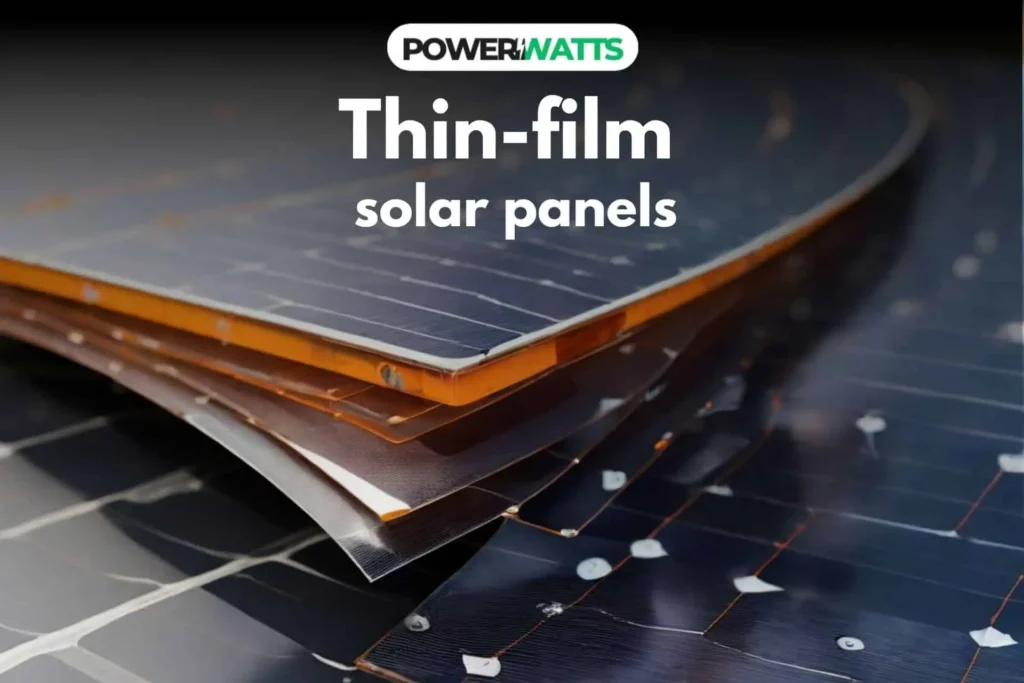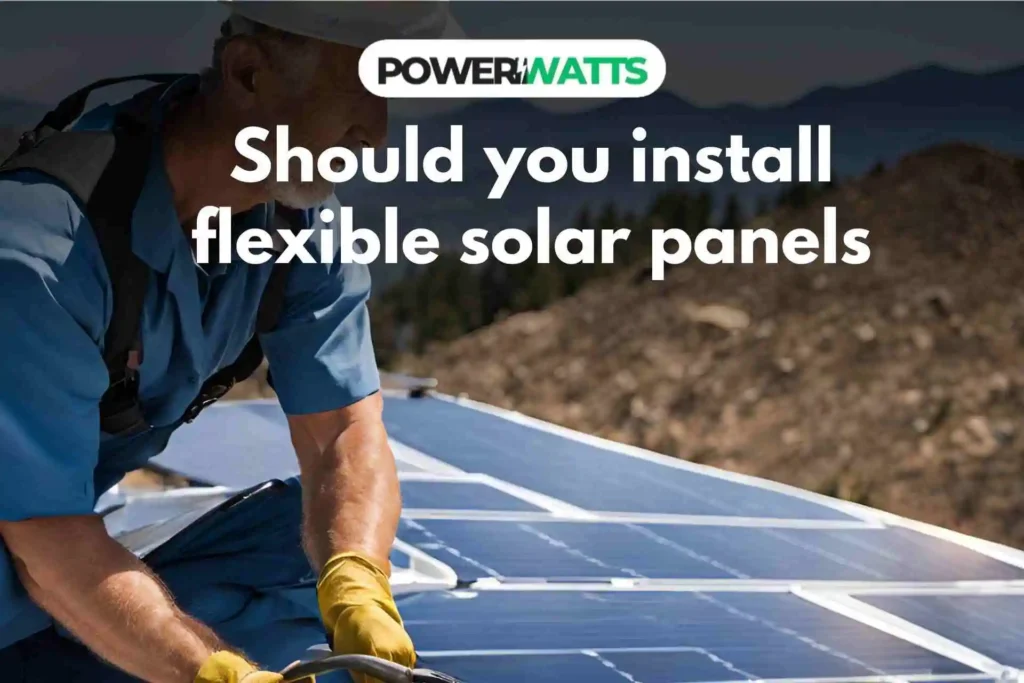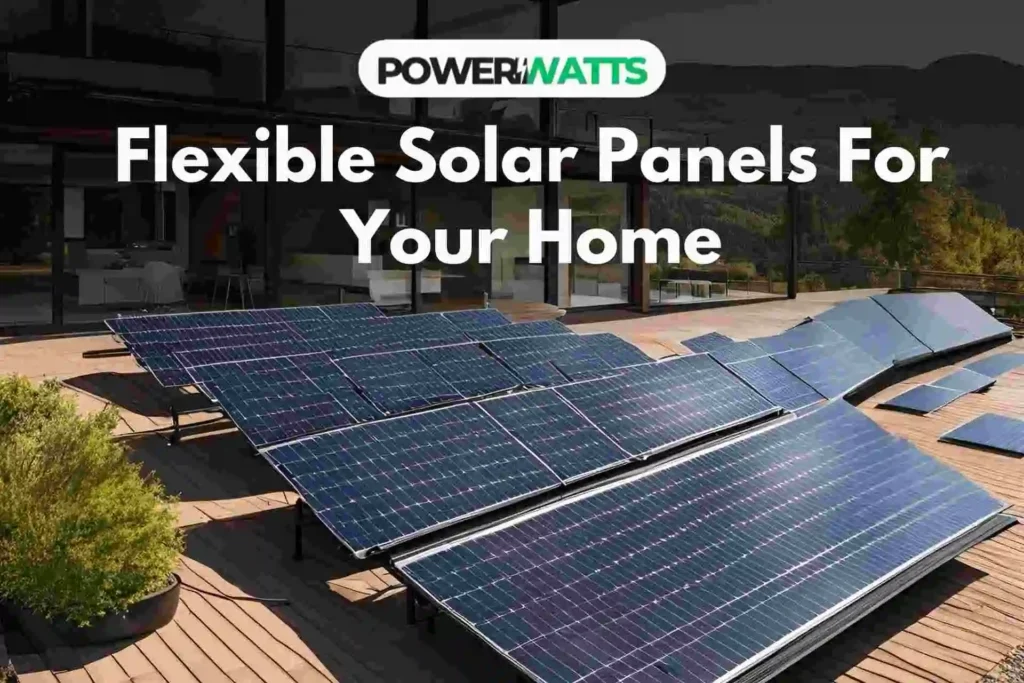Are you looking for a place to get solutions that can help you power an RV, a boat or other campsite equipment using solar energy?
Flexibility in solar panels is something that one should consider installing. These are not as big as the recommended residential solar panels but are convenient sources of portable renewable energy.
Technology in the manufacture of solar panels is progressing each year, and one can only think of new inventions like flexible solar panels.
Flexible solar panels, unlike regular ones, are generally slim, act as power sources for devices, and can be employed without the help of the electricity network.
For information regarding best flexible solar panels for the generation of portable solar power, we outline what they are, provide the flexible solar panel buyer’s guide, and how they contrast with conventional solar systems.
What Are Flexible Solar Panels?
Best flexible solar panels work in the same way as conventional rooftop solar panels, which is by converting light energy into electrical energy through photovoltaic cells.
Portable solar panels are similar to the normal solar system but they are more flexible. While the conventional solar panels. They are not strong enough to run a house but are sufficient to power boats, RVs, campers or even a camping site.
Flexible panels are very slim, and lightweight and can be installed without much effort. They are also flexible, and thus can easily be fitted on a curved roof or window.
- They are also more compact and lighter in weight and you can easily come across models that do not exceed 10 pounds.
- It is impossible to use a device of such dimensions and mass as a portable power source.
Types of Flexible Solar Panels
The basic unit of a solar panel is the cell, so let’s begin with that. Here are how the types of flexible solar panels differ:
- Monocrystalline
- Polycrystalline
- Thin-film solar
Monocrystalline
Monocrystalline and polycrystalline solar panels are made from the same material, crystalline silicon, but there is a difference. Monocrystalline cells are made from single-crystal silicon wafers and hence the whole cell has a consistent microscopic orientation.
This leads to a higher efficiency of converting the energy from one form to another. Polycrystalline cells are easier to produce because silicon turns into multiple crystals with random orientations. This leads to a lower price but also a lower efficiency as compared to the initial situation.
Polycrystalline
These more affordable panels are less efficient than mono ones and produce less power. Similar to mono panels, poly panels incorporate silicon wafers into their structure.
Poly cells are made up of smaller silicon cells that are broken up, and these breaks decrease the efficiency of the panel. Due to the fact that poly panels offer less power, you will require more panels in your installation to generate the required power.

Thin-film solar
Thin-film cells can be poly or mono, but they are up to 300 times thinner than their rigid counterparts. Besides, the advantages of thin-film panels are obvious flexibility, and sometimes thin-film panels can have better low-light performance than rigid panels. But they are generally less efficient than the other types of cells.
The 3 Best Flexible Solar Panels
| Product Name | Efficiency | Weight | Radius |
| SunPower 110-Watt | 18.35% | 4.4 Pound | 30 Degree |
| Renology 175 Watt | 17.3% | 6.2 Pound | 248 Degree |
| TP-solar 50 Watt | Not Available | 3.97 Pound | 30 Degree |
What To Look For Flexible Solar Panels
However, we have only described four of the best flexible solar panels brands, but there are more in the market. Here are the areas consider to when comparing flexible solar products:
Cost:
- Just to remind you, you can get 100 W flexible solar panels of great quality for less than $250.
- For the higher wattage models ranging from 200 W to 300 W, the cost is between $300 and $400. Be careful with modules that are too expensive, but also remember that cheap products can be of low quality.
Warranty:
- A good warranty guarantees that you will receive a replacement free of charge in case of a faulty flexible solar panel. But be careful and do not deviate from the instructions provided by the manufacturer, otherwise you will lose the warranty.
Wattage:
- Flexible solar panels come in different sizes and you have to ensure that your wattage corresponds to the intended use. A 20-W solar panel is sufficient to charge your smartphone, but if you require charging several small appliances, you will need at least 100 W.
Included Components:
- Some of the portable solar panel kits come with lithium batteries, inverters, charge controllers, and sockets for small appliances. But there are also cases when the solar panels are sold separately, and you have to buy these components separately.

Should you install flexible solar panels?
A portable solar panel system is often more suitable for solar power when travelling rather than for home solar power. If you are hiking, car camping, or driving long distances, it is always useful to have a portable, lightweight, and flexible solar panel to generate free, clean electricity from the sun.
Easily find the right solar panel setup for your home
Whether you are interested in thin-film solar panels or conventional monocrystalline and polycrystalline modules, it is advisable to compare the solar quotes from different installers to choose the best one for your property. At Powerwithwatts, you will get a quote from certified and screened installers and you will be able to compare them.
Our installers provide many excellent solar solutions (including solar with storage solutions with lithium batteries). They can help you design your solar solution so you can begin producing clean energy right from your home. If you have your eye on a specific product or manufacturer, make a note of it on your property profile so that the installers can adjust the quote they give you.
Conclusion
Portable solar panels enable you to harness the power of solar energy in your recreational activities. While flexible panels are not as powerful or efficient as traditional panels, they are ideal for small-scale solar applications and RVs.
They are ideal for an RV’s roof, a camper’s back window, or a car’s hood due to the fact that they are portable and flexible. It is advisable to compare at least three brands before purchasing the product.
FAQS
Are flexible solar panels worth it?
Flexible solar panels can be beneficial when the panels have to be movable like RVs, or boats, or when the surface is curved, but they are not as efficient or long-lasting as the standard panels. Consider your needs first.
Do flexible solar panels get too hot?
Yes, flexible solar panels are also capable of getting too hot. They are generally known to be more conductive of heat than rigid panels, making them less efficient.
What are the problems with flexible solar panels?
Lower efficiency in the process of photosynthesis and the conversion of sunlight into energy.
Slightly more susceptible to bending, scratching, and weather.
May not have the same durability as the rigid panels.


